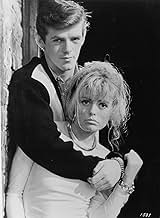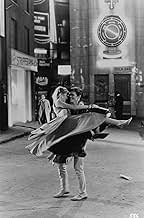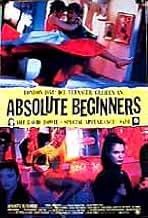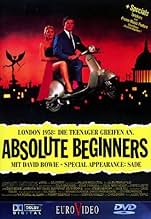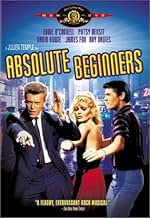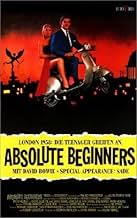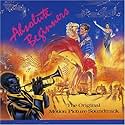VALUTAZIONE IMDb
5,6/10
3883
LA TUA VALUTAZIONE
Nella Londra del 1958, un giovane fotografo cerca l'attenzione dei media per conquistare una stilista bellissima e ambiziosa di cui è innamorato.Nella Londra del 1958, un giovane fotografo cerca l'attenzione dei media per conquistare una stilista bellissima e ambiziosa di cui è innamorato.Nella Londra del 1958, un giovane fotografo cerca l'attenzione dei media per conquistare una stilista bellissima e ambiziosa di cui è innamorato.
- Regia
- Sceneggiatura
- Star
Joseph McKenna
- Fabulous Hoplite
- (as Joe McKenna)
Edward Tudor-Pole
- Ed the Ted
- (as Tenpole Tudor)
Recensioni in evidenza
I had just graduated high school(in California) when this movie came out, in the summer of 1986. Given the heavy promotion given it by MTV(I believe they had a contest whose winner would appear in the film, though I may have remembered that wrong), and given that David Bowie, whose music career was on the upswing, had a starring role(along with a mix of musicians like veteran Ray Davies(of the Kinks) and newcomer Sade), you'd expect the movie would be a hit. Instead, it barely made a dent in America(in their year-end issue, Rolling Stone called it one of the hype jobs of the year), and seems to have been largely forgotten(though in an interview with Rolling Stone about a year later, Bowie claimed it was a cult hit). In fact, while star Patsy Kensit has had an erratic career, Bowie continued to make music and the occasional movie, and director Julien Temple, after this and EARTH GIRLS ARE EASY, went back to his forte, music videos, it's sort of ironic that the most successful person to come from that movie is Robbie Coltrane(TV's CRACKER), who only had a small role here.
Why am I boring you all with this? Because ABSOLUTE BEGINNERS is one of the unsung classics of the 80's. Of course, having grown up on old-time musicals(my dad was a fan), I'm probably more receptive to them than the average person seems to be today, but this is one of the best ones of the last two decades. Not only are all the numbers well-written and well sung(in addition to Bowie, Davies, and Sade, jazz great Gil Evans wrote the instrumental score, and Style Council contributes a song. Also, female lead Patsy Kensit sings one, while male lead Eddie O'Connell lip-syncs his numbers), they're also imaginatively staged. A good example is "Motivation," one of two numbers Bowie sings(the other being the title song), which includes parodies of Busby Berkley-type numbers. There's also a wicked parody of teen pop.
As for the story, Temple has the fine novel to fall back on(by Colin MacInnes), and while there's probably too many ideas trying to burst out(teen alienation, racism, "Selling Out"(the name of another song), he juggles them all with finesse. And the cast handles things with aplomb, with the exception of, surprisingly, Bowie; while he's appropriately super-smooth as the oily executive, his voice(intended to be an American accent?) is annoying. But O'Connell and Kensit are both fresh and appealing, Anita Morris and James Fox both play well in their typecast roles(as, respectively, a sexpot gossip columnist and an effete fashion designer), there's a nice turn by Mandy Rice-Davies(who, you may remember, was in real life involved in the Profumo scandal), and a host of others in small but memorable parts(the ones I can remember are Steven Berkoff(BEVERLY HILLS COP) and Bruce Payne(PASSENGER 57) as fascists, and Paul Rhys(VINCENT AND THEO) as a mod). All in all, well worth tracking down.
Why am I boring you all with this? Because ABSOLUTE BEGINNERS is one of the unsung classics of the 80's. Of course, having grown up on old-time musicals(my dad was a fan), I'm probably more receptive to them than the average person seems to be today, but this is one of the best ones of the last two decades. Not only are all the numbers well-written and well sung(in addition to Bowie, Davies, and Sade, jazz great Gil Evans wrote the instrumental score, and Style Council contributes a song. Also, female lead Patsy Kensit sings one, while male lead Eddie O'Connell lip-syncs his numbers), they're also imaginatively staged. A good example is "Motivation," one of two numbers Bowie sings(the other being the title song), which includes parodies of Busby Berkley-type numbers. There's also a wicked parody of teen pop.
As for the story, Temple has the fine novel to fall back on(by Colin MacInnes), and while there's probably too many ideas trying to burst out(teen alienation, racism, "Selling Out"(the name of another song), he juggles them all with finesse. And the cast handles things with aplomb, with the exception of, surprisingly, Bowie; while he's appropriately super-smooth as the oily executive, his voice(intended to be an American accent?) is annoying. But O'Connell and Kensit are both fresh and appealing, Anita Morris and James Fox both play well in their typecast roles(as, respectively, a sexpot gossip columnist and an effete fashion designer), there's a nice turn by Mandy Rice-Davies(who, you may remember, was in real life involved in the Profumo scandal), and a host of others in small but memorable parts(the ones I can remember are Steven Berkoff(BEVERLY HILLS COP) and Bruce Payne(PASSENGER 57) as fascists, and Paul Rhys(VINCENT AND THEO) as a mod). All in all, well worth tracking down.
Julien Temple's extravagant musical adaptation of the classic Colin MacInnes novel never reached the audience it deserved, but it could be that filmgoers of the 1980's weren't ready for the breathless bravado of Temple's vision. A hyped-up take on the classic Freed Unit musicals at MGM, with a rock/jazz score featuring David Bowie, Sade, Gil Evans, Slim Gaillard and other notables, this movie is a visual feast and a treat for the ears as well.
Sadly, you have to hope for a theatrical screening to take in the extraordinary cinematography (there's an opening extended-take through the crowded streets of London that rivals the opening of "Touch of Evil" in complexity and beauty) because there has never been a letterbox release of the film on video or disc. Where's the DVD with a Temple commentary?
Sadly, you have to hope for a theatrical screening to take in the extraordinary cinematography (there's an opening extended-take through the crowded streets of London that rivals the opening of "Touch of Evil" in complexity and beauty) because there has never been a letterbox release of the film on video or disc. Where's the DVD with a Temple commentary?
The main attraction here is the score, which features the title song and "That's Motivation," performed and composed by rock icon David Bowie, as well as his version of the classic "Volare." In addition, you get "Killer Blow" performed by Sade and jazz tunes by Charles Mingus and Miles Davis performed by Gil Evans. This movie makes you believe that is David Bowie had been performing in the 1930s he would have been a sensation then too.
A fun musical with a lot of energy and great acting, 'Absolute Beginners' will win a place in your heart. This is the sharpest I've seen Bowie in a film, and Patsy Kensit was beautiful as Suzette. A political piece as well as a time piece, Temple captured the feel of a Broadway or West End musical perfectly. A great turnaround for Temple, who really had me worried after directing 'Mantrap'. It is a musical, so liberties have to be allowed, but for fans of the musical this is a great one to check out. Rating: 27/40
It is often said that the British just can't do film musicals. That even though we're pretty good at theatrical musicals, the cinematic version is, like gridiron football and republicanism, something best left to our cousins across the Atlantic. This prejudice even survived the award of a "Best Picture" Oscar to "Oliver!", and by the mid-eighties the traditional style of film musical was at a pretty low ebb even in America and virtually extinct in Britain. "Absolute Beginners" was therefore something completely unexpected. It was a British musical which owed nothing to Broadway and very little to the sort of pop-and-rock musicals ("Saturday Night Fever", "Fame", "Flashdance", etc.) which Hollywood had started to turn out in the seventies.
The film was also adapted from an unexpected source; the Colin MacInnes book of the same name about youth culture in late 1950s London. I doubt if MacInnes, who died in 1976, ever imagined that his novel would ever be turned into a musical. The story is set in the long hot summer of 1958. (At least, that's how MacInnes describes it, although Met Office records show that the summer of that year was wet and cool). The main character is Colin, a young photographer. In the original novel he was unnamed, but here he is named after his creator, rather oddly given that the book was not intended to be autobiographical. (MacInnes would have been 44 in 1958, a generation older than his character).
Colin falls in love with Crepe Suzette, an aspiring fashion designer, but she gets engaged to her boss Henley of Mayfair, motivated by career advantage rather than love, as Henley is an arrogant and unpleasant individual, old enough to be Suzette's father. In the book, in fact, the compulsively promiscuous Suzette is also not very pleasant, but here her character is very much softened. The film also deals with the Notting Hill race riots, shown here as having been whipped up by a Fascist rabble-rouser, unnamed but clearly based upon Oswald Mosley. The said demagogue is in league with a corrupt property developer who wants to drive the black inhabitants out of Notting Hill, at the time a very run-down area, in order to further one of his redevelopment schemes.
"Absolute Beginners" was panned by the critics and failed at the box-office. Together with the commercial failures of two other films released about the same time, "Revolution" and "The Mission", it led to a decline in the fortunes of Goldcrest, the major British film studio of the eighties. Some even started talking of a crisis in the British film industry, which had produced so many great films in the first half of the decade. The film was also disliked by literary purists who complained that it was not faithful to the original novel, particularly in the rewriting of MacInnes' ending and the bowdlerisation of Crepe Suzette's character.
And yet I loved the film and still do, even though the critics were partly right. Yes, the film has its flaws. Eddie O'Connell makes an uncharismatic hero, and seems too old for the part of Colin, who is supposed to be a teenager. (O'Connell has faded from view since 1986 to such an extent that I have been unable to find his exact date of birth, but he appears to be about thirty). The storyline does not always flow smoothly, perhaps not surprisingly given that it was the first feature film of its director Julien Temple, thitherto better known as the maker of pop videos and a documentary about the Sex Pistols. As for the literary purists, they are certainly right about its lack of fidelity to its literary source, although in its defence I should say that had it not been for this film I should in all probability never have discovered MacInnes' brilliant novel or his other writings.
The acting, like much in the film, is deliberately stylised. (Those who call it wooden are missing the point). The lovely Patsy Kensit makes a delightful heroine as Suzette in what has been described as her breakthrough role. At the time she was hailed as the "British Bardot" and is still a familiar face, even if she has never achieved her much-quoted ambition "to be more famous than anything or anyone".
Despite its faults, "Absolute Beginners" is a cool and stylish movie. It probably has little to do with the fifties as they actually were, but a lot to do with the fifties as they should have been. It has an immense drive and energy with an absolutely irresistible soundtrack. Modern audiences might be surprised that this is largely jazz based, given that we now tend to look back at the late fifties as the birth of the rock-and-roll era. At that time in Britain, however, before the rise of the Beatles, jazz was still very much part of the youth scene, particularly of the "mod" subculture, rock being associated with the mods' rivals, the "rockers". A number of leading musicians, such as David Bowie, Sade and the Style Council contributed to the film. (Bowie also makes an acting contribution as the property developer Vendice Partners).
I have a personal reason why this film is a favourite. It brings back memories a long hot summer- not that of 1958, when I was not even born, but that of 1986. At the time, I was young and in love and went to see the film with my girlfriend. I remember us coming out of the cinema together on a warm summer's evening, exhilarated by what we had just seen, and walking along the London Embankment, laughing and singing Bowie's great theme song to one another. "As long as we're together, all the rest can go to hell- I absolutely love you". With a memory like that, how could I do other than love this film? 8/10
The film was also adapted from an unexpected source; the Colin MacInnes book of the same name about youth culture in late 1950s London. I doubt if MacInnes, who died in 1976, ever imagined that his novel would ever be turned into a musical. The story is set in the long hot summer of 1958. (At least, that's how MacInnes describes it, although Met Office records show that the summer of that year was wet and cool). The main character is Colin, a young photographer. In the original novel he was unnamed, but here he is named after his creator, rather oddly given that the book was not intended to be autobiographical. (MacInnes would have been 44 in 1958, a generation older than his character).
Colin falls in love with Crepe Suzette, an aspiring fashion designer, but she gets engaged to her boss Henley of Mayfair, motivated by career advantage rather than love, as Henley is an arrogant and unpleasant individual, old enough to be Suzette's father. In the book, in fact, the compulsively promiscuous Suzette is also not very pleasant, but here her character is very much softened. The film also deals with the Notting Hill race riots, shown here as having been whipped up by a Fascist rabble-rouser, unnamed but clearly based upon Oswald Mosley. The said demagogue is in league with a corrupt property developer who wants to drive the black inhabitants out of Notting Hill, at the time a very run-down area, in order to further one of his redevelopment schemes.
"Absolute Beginners" was panned by the critics and failed at the box-office. Together with the commercial failures of two other films released about the same time, "Revolution" and "The Mission", it led to a decline in the fortunes of Goldcrest, the major British film studio of the eighties. Some even started talking of a crisis in the British film industry, which had produced so many great films in the first half of the decade. The film was also disliked by literary purists who complained that it was not faithful to the original novel, particularly in the rewriting of MacInnes' ending and the bowdlerisation of Crepe Suzette's character.
And yet I loved the film and still do, even though the critics were partly right. Yes, the film has its flaws. Eddie O'Connell makes an uncharismatic hero, and seems too old for the part of Colin, who is supposed to be a teenager. (O'Connell has faded from view since 1986 to such an extent that I have been unable to find his exact date of birth, but he appears to be about thirty). The storyline does not always flow smoothly, perhaps not surprisingly given that it was the first feature film of its director Julien Temple, thitherto better known as the maker of pop videos and a documentary about the Sex Pistols. As for the literary purists, they are certainly right about its lack of fidelity to its literary source, although in its defence I should say that had it not been for this film I should in all probability never have discovered MacInnes' brilliant novel or his other writings.
The acting, like much in the film, is deliberately stylised. (Those who call it wooden are missing the point). The lovely Patsy Kensit makes a delightful heroine as Suzette in what has been described as her breakthrough role. At the time she was hailed as the "British Bardot" and is still a familiar face, even if she has never achieved her much-quoted ambition "to be more famous than anything or anyone".
Despite its faults, "Absolute Beginners" is a cool and stylish movie. It probably has little to do with the fifties as they actually were, but a lot to do with the fifties as they should have been. It has an immense drive and energy with an absolutely irresistible soundtrack. Modern audiences might be surprised that this is largely jazz based, given that we now tend to look back at the late fifties as the birth of the rock-and-roll era. At that time in Britain, however, before the rise of the Beatles, jazz was still very much part of the youth scene, particularly of the "mod" subculture, rock being associated with the mods' rivals, the "rockers". A number of leading musicians, such as David Bowie, Sade and the Style Council contributed to the film. (Bowie also makes an acting contribution as the property developer Vendice Partners).
I have a personal reason why this film is a favourite. It brings back memories a long hot summer- not that of 1958, when I was not even born, but that of 1986. At the time, I was young and in love and went to see the film with my girlfriend. I remember us coming out of the cinema together on a warm summer's evening, exhilarated by what we had just seen, and walking along the London Embankment, laughing and singing Bowie's great theme song to one another. "As long as we're together, all the rest can go to hell- I absolutely love you". With a memory like that, how could I do other than love this film? 8/10
Lo sapevi?
- QuizThe character of "Harry Charms" was based on a real-life British manager and impresario of the period, Larry Parnes, who was famous for hiring unknown singers and giving them extravagant stage names (his most famous client was Billy Fury). In 1960 he hired an unknown Liverpool band called The Beatles to accompany one of his lesser stars, Johnny Gentle, on a tour of Scotland, but he decided not to take the Beatles on as clients because he was only interested in handling solo singers, not groups.
- BlooperDuring the riot scenes, in one shot a double decker bus is on fire. In the next shot, it isn't burning. In the next shot, it is. (During the T.V. announcers speak to the viewing public about the 'race riots').
- ConnessioniEdited into Ray Davies: Quiet Life (1986)
- Colonne sonoreSanta Lucia
Performed and composed by Ekow Abban
I più visti
Accedi per valutare e creare un elenco di titoli salvati per ottenere consigli personalizzati
- How long is Absolute Beginners?Powered by Alexa
Dettagli
- Data di uscita
- Paese di origine
- Lingua
- Celebre anche come
- Absolute Beginners - The Musical
- Luoghi delle riprese
- Aziende produttrici
- Vedi altri crediti dell’azienda su IMDbPro
Botteghino
- Lordo Stati Uniti e Canada
- 930.211 USD
- Fine settimana di apertura Stati Uniti e Canada
- 83.743 USD
- 20 apr 1986
- Lordo in tutto il mondo
- 930.211 USD
- Tempo di esecuzione1 ora 48 minuti
- Colore
- Proporzioni
- 2.35 : 1
Contribuisci a questa pagina
Suggerisci una modifica o aggiungi i contenuti mancanti

Divario superiore
By what name was Absolute Beginners (1986) officially released in India in English?
Rispondi

